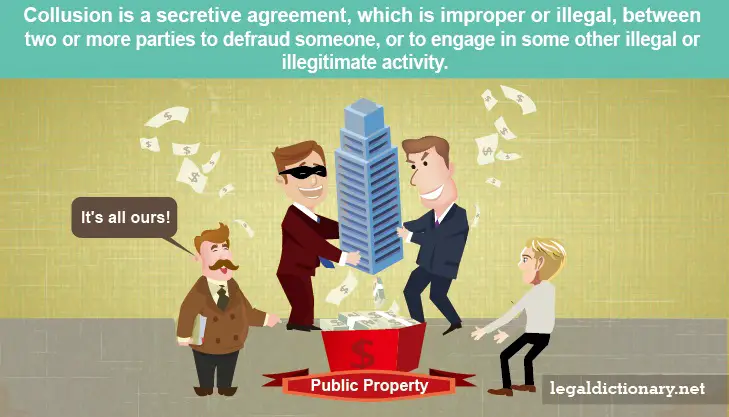Collusion
The term collusion refers to a secretive agreement, which is improper or illegal, between two or more parties to defraud someone, or to engage in some other illegal or illegitimate activity. Collusion may be engaged in by parties with conflicting interests in order to limit or remove the influence of a competitor. It may also be used in an attempt to gain some unfair or illegal advantage. To explore this concept, consider the following collusion definition.
Definition of Collusion
- noun. Secret agreement or cooperation, especially for treacherous or fraudulent purposes.
- noun. A secretive understanding between parties to defraud someone of his or her rights, or to gain something unlawfully or illegitimately.
Origin 1350-1400 Middle English
What is Collusion
Collusion is a practice of economics and market competition that is illegal in the United States. Collusion involves the cooperation, often in secret, of rival companies to gain some mutual benefit at the expense of another company, or other group. Ideally, the economy is a function of supply and demand, which drives prices, equalizes profits, and increases job availability. When companies join together in an attempt to manipulate prices, especially when such collusion minimizes consumer choice by minimizing or eliminating competition, it is an unlawful act.
Example of Collusion
The state issues a Request for Proposal to take bids on provision of all of the paper for every school district in the state. There are sure to be hundreds of bids, many by small companies, so ABC paper company meets with its rival, XYZ paper company to make an agreement to provide identical low bids. In this example of collusion, they feel they will be able to squeeze out the smaller companies, to obtain this very lucrative contract.
Collusion Example in the Great Electrical Equipment Conspiracy
Price fixing is a form of collusion that involves cooperation between providers of a particular product or service in order to restrict competition and raise prices. While most companies caught and convicted of price fixing are small firms, a couple of powerhouse companies joined forces in the 1950s to manipulate the market in industrial electrical equipment. Those products included steam turbine generators, transformers, and switchgears, among others.
With the rapid modernization of industrialized America, the need for switchgear, which are sets of fuses, circuit breakers, and disconnect switches, skyrocketed to an annual total of around $75 million. Rather than compete with foreign manufacturers of these products, 47 U.S. companies, including General Electric, Westinghouse, and Allis-Chalmers, conspired to engage in a variety of methods to fix prices. When the Tennessee Valley Authority, a federal corporation, began receiving identical bids on various electrical equipment, it blew the whistle on the collusion scheme.
This price-fixing scheme was labeled the Great Electrical Equipment Conspiracy, and still serves as a model of collusion today. Many of the company executives involved in the conspiracy were convicted of criminal activity and sentenced to prison. Twenty-nine of the companies themselves were fined to the tune of about $2 million, the equivalent of about $20 million today.
In addition, federal law at the time entitled anyone whose business had suffered damages as a result of anti-trust violations, including collusion, to an award of three times the amount of its financial loss. Shortly after the verdict in this example of collusion, more than 3,500 public and private utility companies filed lawsuits complaining they had been overcharged on electrical equipment.
Non-Collusion Affidavit
Collusion in bidding for government contracts has cost the government many millions of dollars. Because of this, a process of requiring any individuals or companies submitting bids and proposals for the provision of goods or services to also submit an Affidavit of Non-Collusion. This requirement helps keep overall costs down, and serves to protect the reputations of honest providers of such goods and services.
An Affidavit of Non-Collusion is a declaration that the bid amount was arrived at independently, and that the bidder did not enter into any sort of secret agreement in its making. This includes any agreement to enter identical bids for the same goods or services. Entities that require an Affidavit of Non-Collusion generally provide the blank form, which must be completed and notarized.
Sample Non-Collusion Affidavit
I, [insert name of individual preparing proposal], in my capacity as [insert position] at [insert name of company], located at [insert address], hereby certify that:
- The budget shown in the Bid Proposal dated [insert date] has been arrived at independently and without consultation, communication, or agreement with any other bidder, contractor, or other respondent to the Request for Proposal.
- Neither the proposal, nor the prices contained within it, have been disclosed to any other bidder, contractor, or respondent to the Request for Proposal, and such information will not be disclosed prior to the opening of the proposal.
- No attempt has been made, nor will be made, to induce any person or firm to refrain from responding to the Request for Proposal, or to submit a deliberately high or non-competitive proposal.
- The proposal and budget prepared by me is made in good faith, and not pursuant to any agreement or discussion with, or inducement from, any person or firm to submit a matching or otherwise non-competitive proposal.
- No person, firm, or corporation has received, nor will receive, directly or indirectly, any gift, commission, fee, or rebate, or any other thing of value, in exchange for submitting a non-competitive bid.
I certify, under penalty of perjury under the laws of the state of [insert state], that the contents of this Affidavit are true and correct.
Related Legal Terms and Issues
- Civil Lawsuit – A lawsuit brought about in court when one person claims to have suffered a loss due to the actions of another person.
- Damages – A monetary award in compensation for a financial loss, loss of or damage to personal or real property, or an injury.
